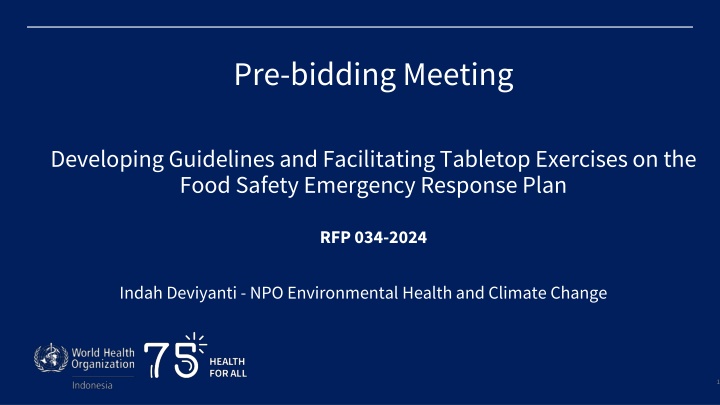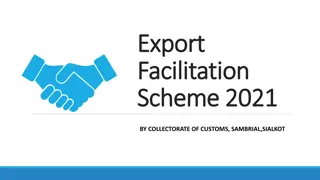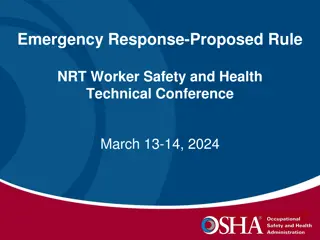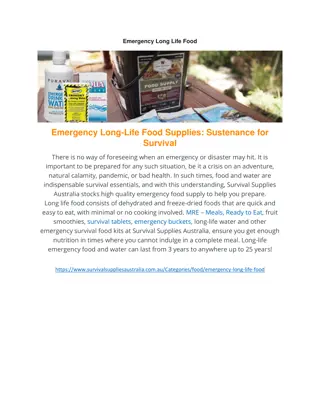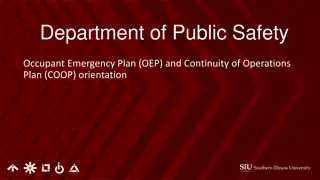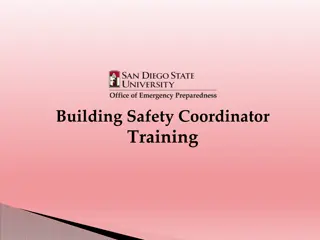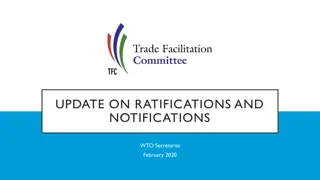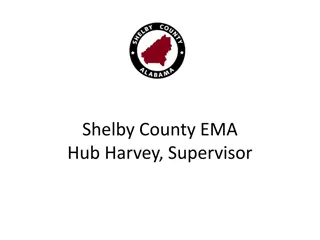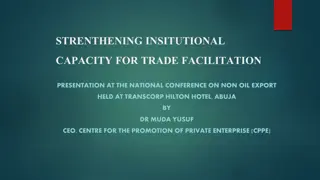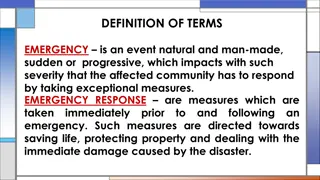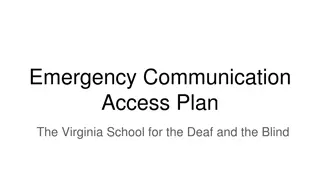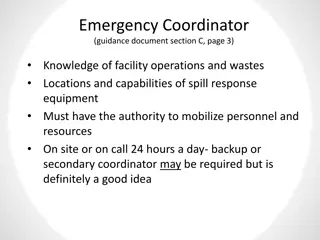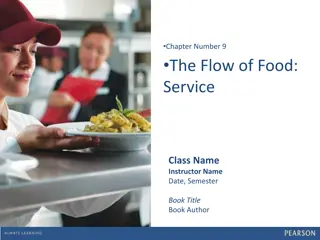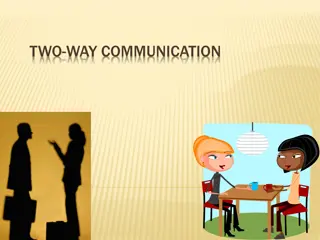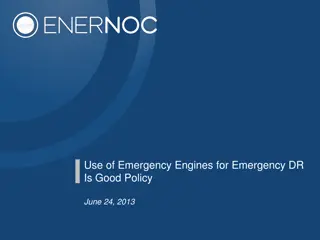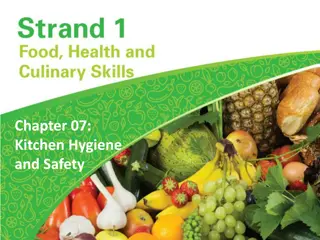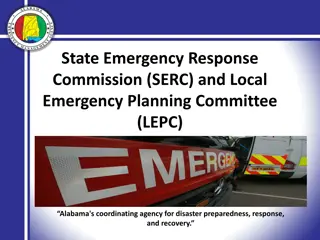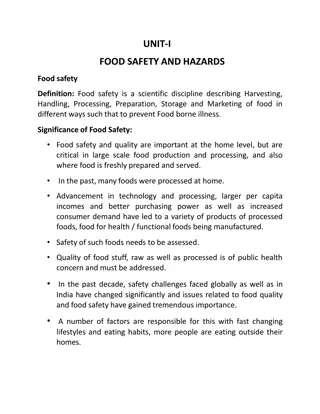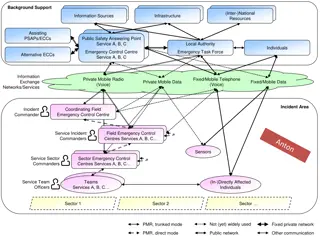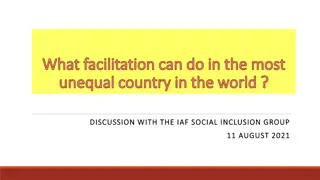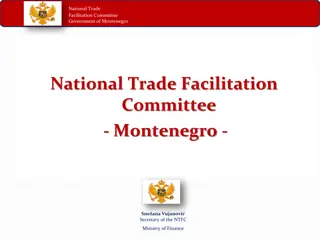Development and Facilitation of Food Safety Emergency Response Plan
This Request for Proposal involves conducting a pre-bidding meeting, developing guidelines, and facilitating exercises for the food safety emergency response plan. The project aims to strengthen the national food control system through assessment, evaluation, and tabletop exercises aligned with ASEAN initiatives. Close coordination with relevant ministries and stakeholders is crucial for successful implementation and reporting of the project outputs.
Download Presentation

Please find below an Image/Link to download the presentation.
The content on the website is provided AS IS for your information and personal use only. It may not be sold, licensed, or shared on other websites without obtaining consent from the author.If you encounter any issues during the download, it is possible that the publisher has removed the file from their server.
You are allowed to download the files provided on this website for personal or commercial use, subject to the condition that they are used lawfully. All files are the property of their respective owners.
The content on the website is provided AS IS for your information and personal use only. It may not be sold, licensed, or shared on other websites without obtaining consent from the author.
E N D
Presentation Transcript
Pre-bidding Meeting Developing Guidelines and Facilitating Tabletop Exercises on the Food Safety Emergency Response Plan RFP 034-2024 Indah Deviyanti -NPO Environmental Health and Climate Change 1
Background Background Food emergency risks and its impacts on health and economic Needs of strengthening food control system Recommendation for National food control system assessment (2023); Joint external evaluation (2023), ASEAN Food Safety Workplan (2022-2026) to establish National food safety emergency response plan FSER as part of activities in the MoU between Indonesian FDA (BPOM) and WHO
Purpose of The Call Purpose of The Call The objectives* 1. To conduct desk review and situation analysis on FSER . 2. To develop national guidelines on FSER 3. To conduct national and ASEAN table-top exercises on FSER applying the draft national FSER guidelines.
Implementation Planning Implementation Planning Activity Coordination Activity Coordination Close coordination and consultation across the implementation step with WHO SEARO (as ASEAN also consist WPRO countries the consultation with regional offices may involve WPRO), WHO Indonesia, BPOM. Other relevant ministries and stakeholders will be involved (MoH, MoA, Bapanas, MoI, Kemenkeo PMK, MoMAF, BRIN, Kominfo, experts, academia, associations)
Implementation Planning Implementation Planning Reporting Output Reporting Output The appointed institution will share the outputs in the form of following: The technical report (each deliverables and final report) Activity report (including meeting notes and activity photo) Technical report in presentation slides (in both Bahasa Indonesia and English).
Implementation Implementation Planning Planning Detail Activities Detail Activities and Outputs and Outputs
Implementation Implementation Planning Planning Detail Activities Detail Activities and Outputs and Outputs 1. Preparing the assessment tools. In the proposal, the institutions should describe the possible outline of the assessment tools. Deliverable: The assessment tools 2. Doing desk reviews and FGD / stakeholder meetings. -In the proposal, the institutions should describe the methodology of desk review and stakeholder discussions. Deliverable: The situation analysis of national FSER 3. Conducting stakeholder discussion to share situation analysis findings. In the proposal, the institutions should propose the tentative schedule. Deliverable: The situation analysis report and presentation template Please refer to the TOR for estimated number of participants
Implementation Implementation Planning Planning Detail Activities Detail Activities and Outputs and Outputs 4. Gathering information includes the core key persons, the multi-agency collaboration in each ASEAN Member state (AMS), the mechanism for rapid response to food safety incidents and crises, and the current definition of food safety events established in each AMS. In the proposal, the institutions should describe the methodology of review and stakeholder discussions. Deliverable: Comparison of the best practices of FSER guidelines from other countries (preferably ASEAN countries) 5. Conducting stakeholder discussion to share situation analysis findings. In the proposal, propose the tentative agenda outlining the objectives, topics to be discussed per each meeting, and proposed timeline for each meeting. Deliverable: Document the outcomes, decisions, and action points from each meeting, preparing a comprehensive report summarizing the FSER guideline development process; Draft of National FSER guideline Please refer to the TOR for estimated number of participants
6. Preparing the framework / report and response pathway of food safety emergency response, linking all relevant food safety emergency networking and international health regulation. In the proposal, the institutions should describe the key elements in the framework. Deliverable: Draft of FSER framework Please refer to the TOR for estimated number of participants
7. Developing a scenario-based simulation, presenting hypothetical food safety emergency scenarios and encourage participants to brainstorm response strategies, considering the role of various coordination platforms and stakeholders. In the proposal, the institutions should describe the key scope of simulation package. Deliverable: Tabletop simulation package Please refer to the TOR for estimated number of participants
8. Testing the food safety emergency scenarios. In the proposal, the institutions should propose the tentative general steps to conduct the simulation. Deliverable: tabletop exercise report 9. Sharing the observation and recommendation of the tabletop exercise and develop a plan for implementing follow-up actions based on the findings and recommendations from the tabletop exercise. In the proposal, the institutions should propose the methodology of the meeting. Deliverable: High level recommendations for FSER implementation in Indonesia in Bahasa and English Please refer to the TOR for estimated number of participants
Team Qualification Team Qualification Mandatory Desirable - Experience in conducting national and regional situation analysis in food control or public health in collaboration with government stakeholders - Experience in developing guidelines in food safety or health surveillance - Proven experience in food safety emergency response planning and other health emergency response simulation including experience in the development, conduct and evaluation of emergency exercises - Track record of delivering high-quality training and capacity-building activities in the field of food safety or food safety emergency response - Experience drafting assessment tools, guidelines, and protocols for emergency response or food risk management-related protocol 1. Team Leader (1 person) 2. Technical staff (4 persons) 3. Admin staff (1 person)
TIMEFRAME TIMEFRAME Estimated Start Date: 1 July 2024 End Date: 31 December 2024 The total timeline for the project is 6 months The appointed institution should develop detailed Gantt chart with the responsible team.
Administration requirements All transaction incurred cost must have original receipt. Original receipts will be forwarded to WHO for subsequent post facto processing, as the receipt are WHO's property. Payment to supplier is only upon deliverable, hence all deliverable expected to be done on time. The provision of a down payment subsequent to the countersigned contract is considered, contingent upon submission, accompanied by a justification detailing its necessity. Follow SBU/harmonized rate attached in the TOR Follow budget template (consult with Procurement team for any queries) Follow the evaluation criteria as stated in the TOR Do not consult with the WHO technical unit during bidding process. If you have any questions, please contact seinobids@who.int Institution's fee should not exceed 5% Separate the technical proposal and budget proposal If there are discrepancies, during the implementation, the technical and admin unit to be consulted. Budget revision and Non-Cost Extension is subject for discussion with WHO before the implementation of the project Detailed administrative information will only be shared with the selected supplier following the conclusion of the bidding process.
Lets Discuss Thanks Please contact for further clarifications seinobids@who.int
